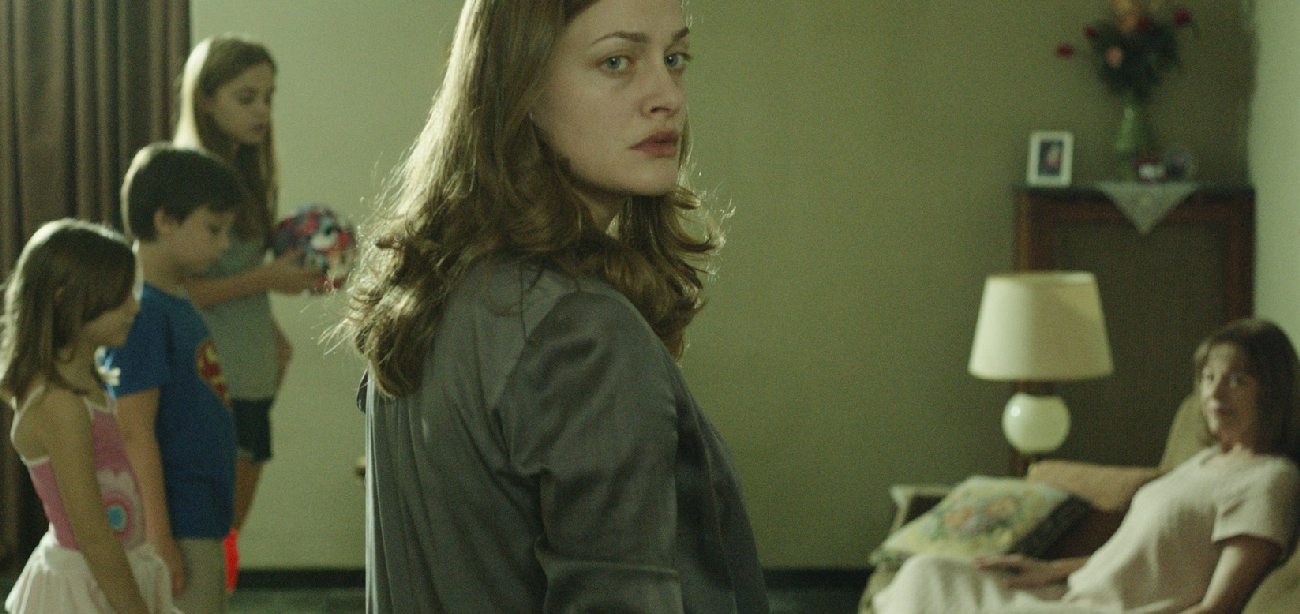
It’s rare for me to say that a film truly breaks new ground but Miss Violence, the second feature from Greek writer/director Alexandros Avranas, may just do that – being both completely repugnant and ploddingly dull. The film is near-reprehensible in its depiction of violence, both sexual and physical, against women (and children) and lacks any semblence of meaning or thematic value. It is, without a doubt, one of the worst films I have ever seen programmed at a film festival and its victories in Venice, for director Avranas and actor Themis Panou, seem truly absurd.
The plot, much like the stylistic decisions within the film, amount to a bizarro reincarnation of the superb Greek New Wave feature Dogtooth, following a secretive family who adhere to odd and idiosyncratic traditions and customs. When one of the daughters in the family, who has just turned 11, smiles to the camera and jumps to her death from a balcony, the family faces the scrunity of the welfare office, with the father figure, listed only in the credits as Father1, taking control to restore the family to an emotional balance. As the film progresses, though, we begin to see the morally horrific family structure, with the film seeming to revel in its ability to position terrible situations as stasis. A major issue for the film, though, is that despite its attempts to build to a shocking depraved climax, it’s so one-note that it essentially tells you all that you need to know in the first half hour. Playing with the audience’s perceptions of who each character is within the family structure essentially undoes a major point of tension straight away and some truly blunt close ups and facial expressions in the very opening scene speak volumes, rendering the thrust of the plot completely redundant.
The film has nothing of value from a cinematic perspective, either. Borrowing shots from Dogtooth and throwing in a well-formed Ulrich Seidl-esque frame every now and then only serves to reflect better on those artistic works, which were able to bring both a sense of dread and moral unease whilst still playing with character and visual form in unique ways. Miss Violence is shot almost entirely under this unpleasant yellow filter, its visual blandness mirrored in the narrative.
If it wasn’t a festival screening there’s a high likelihood I would have walked out of this one. At numerous points, long after the realisation of plot direction early in the film, I sensed that I would gain nothing from the experience of watching it. Proving me correct, the film never goes beyond what it sets up for itself, it never apes any of its predecessors in the Greek New Wave. In fact, it perhaps is a true bastardisation of that movement, replacing oddity with degradation and lacking any substantive characterisation. It seems like it’s trying to be clever with regard to subverting audience expectations or in its depiction of a patriarchal figure as somehow emblematic of Greek societal structures in the 1980s. Instead it’s dumb, unsubtle and filled only with some weird fixation on shock value, the first actual scene of any sexual activity serving this notion.2
The performance of Themis Panou, as the Father, was a textbook case of a fear-inducing figure, and every time the film stayed close on his face it felt like we were being hit over the head again and again with the same concept. His actions, punshing the kids for some comments a teacher made about them, is perhaps emblematic of why this film is devoid of much merit. In this scene the youngest daughter is forced to stand in front of her slightly older brother and slap him again and again because a teacher said he was getting more aggressive in class since his sister’s suicide. In what is a scene not too far removed from Dogtooth itself, we see every slap (and there are so many of them) as the camera circles around them. The scene lasts a few minutes, or at least feels that way. You get the sense that the audience is being punished for seeing it, like the film is some eternal purgatory. Rather than effectively making a point about punishment within a family, the sequence is the filmic equivalent of diminishing returns – we have the tension up-front, the uncomfortable visual accompaniment but the repetition of action and shot is tedious and uninteresting. It’s lazy filmmaking masquerading as social commentary.
Unlike Haneke or von Trier, who can each wield uncomfortable premises and plots with cinematic aplomb and achieve, at the very least, appreciation for creativity and skill in the filmmaking, Avranas has made something that is truly a waste of time. Don’t waste yours by seeing this.
Around the Staff:
| Saro Lusty-Cavallari | |
| Jeremy Elphick | |
| Mei Chew | |
| Imogen Gardam | |
| Grace Sharkey |
